EQUINE WELFARE NETWORK PROFILE
Maine State Society for the Protection of Animals

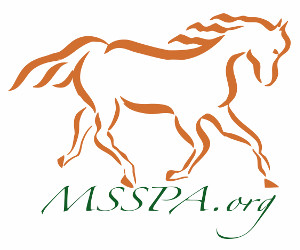
Maine State Society for the Protection of Animals
279 River Road
WINDHAM, ME 04062
Mailing Address:
PO Box 10
SOUTH WINDHAM, ME 04082
Phone: 207-892-3040
MAKE AN INQUIRY
View our WEBSITE
EIN: 01-0212545Founded: 1972
View our PHOTO GALLERY
Profile Last Updated December 8, 2025Public Charity
NEXT CHAPTERS! Click here to view listings of our adoptable equines: Autumn - Bubba - Cherry - Ducati - Glory - Lady - Letti - Motion - Remi - Riza - Smokey - Sophie - Summa Muggs
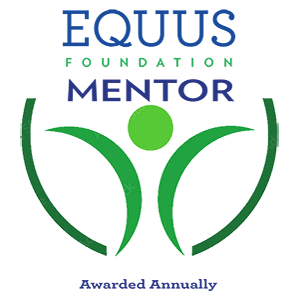
2025
The Mentor Accreditation is awarded annually to an organization that operates at the highest standards for business and equine welfare practices in accordance with EQUUS Foundation guidelines for business and equine welfare practices outlined here.
Awarded Annually
Last Updated: August 25, 2025
Last Updated: August 25, 2025
Walter
Our Equine Ambassador

Walter, known as "The Sweet One" due to his amazing disposition, is a six year-old Standardbred who severed two tendons while racing, and had to be retired. His owner surrendered Walter to the MSSPA. His diagnosis meant Walter would be on stall rest for many months. MSSPA staff has worked with Walter's vet, wrapping his legs, and thinking of creative ways to keep this young boy engaged while standing in his stall. He is GORGEOUS and friendly! and a barn favorite. Walter made progress ahead of schedule, and his healing is coming along beautifully. After very short hand walks, and then longer walks around the farm, Walter was able to be out in a small paddock on his own, and over time, soon moved to a bigger paddock where now he has a paddock-mate named Hercules, a young Gypsy Vanner. The MSSPA is so grateful that Walter joined our herd, and that the Society gets the opportunity to help this boy back to full, good health.
MISSION & PROGRAMS
Mission:The mission of the Maine State Society for the Protection of Animals is to protect the health and welfare of neglected and abused equines. The vision of the Society is to eliminate equine abuse and neglect.
The MSSPA provides superior rehabilitative care as well as access to veterinary services 24 hours a day, and cares for approximately forty equines on its farm facilities. Each year dozens of horses are placed at the Society's farm facilities by Maine law enforcement agencies. Surrenders are accepted on a case by case basis. Following rehabilitation, most animals are adopted into permanent, forever homes. Those unsuitable for adoption remain at the Society in sanctuary for the balance of their natural lives.
Our organization provides programs involved with equine rescue, adoption & retirement
Our organization provides outreach and/or public education programs involving horses.
100% of our total programs and services are equine-related.
Our organization is directly responsible for the care and shelter of equines involved in our programs.
Our organization CURRENTLY uses satellite, overflow, foster, and/or outreach facilities which adhere to all the policies, procedures and practices of our organization or did in the previous year. Facility information is provided for the organization's main, satellite and overflow facilities.
Please describe what steps your organization takes to ensure that:
1) all interactions between your equines and people are mutually beneficial and conducted in accordance with the Guidelines for Human-Equine Interactions stated below;
2) all equines in the care of our organization and/or equines that participate in the organization's program have access to clean drinking water at all times; nutritious food in sufficient quantity, including natural forage such as pasture grass and/or hay; appropriate veterinary, farrier, and dental care; shelter and protection from the weather; sufficient safe space to move around comfortably on a daily basis; and daily opportunity to freely interact and have contact with other equines:
The MSSPA places the care of each equine at the center of the life-saving work that happens here at the farm. The MSSPA is a licensed horse shelter; the focus of the work is the rehabilitation of each horse in the herd. The Society horses are not utilized for equine therapy or ever ridden by the public.
The Society’s staff accompanies each horse through its rehabilitative journey, and all the steps that journey includes, regardless of the timeline. As you might assume, the rehabilitative process is different for each horse in the Society’s care.
Upon arrival, each horse is thoroughly assessed by a veterinarian; this intake exam informs that horse’s individualized re-feeding program, as well as its medical ‘plan’ to recover. Once rehabilitated to optimum health, and once the Society has legal title to a horse (those seized by law enforcement remain in protective custody until the case settles and the title is awarded to the Society), horses are brought into the indoor arena to begin the process of assessing what training (if any) they might have had prior to coming to the farm. Skilled staff work with the horses to assess their level of training with an eye to matching each horse with an adopter of appropriate experience. In 2024, the Society brought a skilled horsewoman and educator on-staff to oversee our Humane Education offerings. Working with each horse and ‘meeting the horse where it is at’ is at the heart of each of these offerings, whether it be to 75 school children or adult horse owners looking to sharpen their skills.
The MSSPA is supported by nearly 180 active volunteers - each oriented to the work here, and trained by staff to interact safely with the horses. Part of each horse’s rehabilitation is to interact with people who treat them with kindness - and our volunteers take this work seriously. Volunteers work around the horses with supervision, picking paddocks and grooming the horses.
In the event of an emergency, the Society relies on the skill and availability of five veterinarians to assess the situation and respond.
Equine Transition Services:
Overview of our programs involved with rescue, rehabilitation, retraining, re-homing and/or retirement:
The MSSPA partners with state and local law enforcement to provide shelter and care for abused and neglected horses (seized by Maine Animal Control Officers and State of Maine District Animal Welfare agents) and collaborates wherever possible to maximize the resources of all;
•MSSPA has a memorandum of understanding with Maine’s largest private horse rescue, Horses With Hope. There, skilled staff work with Society horses and continue their rehabilitation and training. Society horses are often adopted directly from Horses with Hope after spending time in their training program. The Society still oversees the adoption process for horses in HWH's care. All services, including care, training, and boarding of the horses are provided by Horses with Hope at no cost to the MSSPA;
•Equine rehabilitation and sanctuary – Paid staff and volunteers, together with veterinarians and farriers, oversee the care of the herd at the MSSPA. Additionally, equines who - for a variety of reasons- are not suitable to be placed in adoptive homes remain in sanctuary (here at the farm) for the duration of their natural life;
•Adoption – The MSSPA believes there is a right home for every horse, and to that end operates a successful horse adoption program, which includes a careful and thorough screening process, pre-placement check of adoptive homes, a meet-and-greet opportunity to introduce potential adopter to the horse, execution of appropriate legal documents, and annual follow-up with each adopted horse for the duration of its lifetime;
•Maine Horse Matchmaker – A free online platform overseen by the Society which offers promotion, networking, and matchmaking services for horses in need of rehoming. These listings, accessible through a Facebook page (and soon, our website) help horse owners no longer able to care for their animals to publicize details about the horse in an effort to find a suitable new home. These horses are not offered for sale. Maine Horse Matchmaker exists to help keep horses from entering the shelter system;
•Feed and Care Bank – A program to provide temporary, emergency financial assistance to Maine horses in need and their owners. After review and discussion with each applicant, the MSSPA expends funds on a range of items, from hay to farrier and vet care;
•Farmland preservation – A large open-space agricultural enterprise on its 124-acre farm annually produces an average of 7,500 bales of hay to help sustain the horses in the shelter.
Outreach and/or Public Education:
The Maine State Society for the Protection of Animals provides many opportunities to share the work of the farm, and educate the public about the importance of the work of animal welfare.
The MSSPA offers Animal Control Officer (ACO) training (both in-person and remotely, to assure it is available statewide). ACOs serve on the front-lines of assessing situations of abuse and neglect across the state and are the agents capable of deeming a situation abusive or neglectful according to Maine statutes and law; offering equine awareness training courses tailored specifically to ACOs and the work they do strengthens the depth of knowledge and familiarity that these officers have with equines and Maine's animal welfare laws. The workshops cover topics such as basic equine body language, capture and containment, evaluation of an equine's condition, and legal considerations. This expertise will aid the officers in determining an equine's health and status when called to assess a situation. ACOs are Maine's 'front-line' enforcement agents; by deepening their experience and knowledge of equine care and Maine law, they in turn will be better able to deepen and foster positive relationships with the community. These trainings also deepen the relationship of the Society with ACOs across the state;
The Society collaborates with several animal shelters in Southern Maine to provide a summer camp experience and humane education to school-age children; additionally, during the school year, the Society hosts hundreds of elementary school-age children (and home-schooled children), along with their teachers and chaparones, to tour the farm and enjoy a hands-on experience learning about the horses. The Society also welcomes seven groups of special ed students from neighboring schools and communities on a weekly basis that perform barn chores; three more groups of special ed students come to the farm to work on a monthly basis.
Society staffers are eager to bring awareness to the life-saving work of the MSSPA. Hands-on learning opportunities at River Road farm and presentations to the public are available upon request. Additionally, staff and Society volunteers offer guided tours of the farm, either scheduled or upon request.
The MSSPA offers both volunteer and paid staff opportunities for incarcerated women who are housed nearby at the Southern Maine Women’s Re-entry Center. The program is designed to give women the skills and experience they need to successfully live as positive citizens and employees after they transition from state correctional facilities into their home communities. The program is a benefit to the horse shelter and to the almost 50 women participating in it since its inception.
The MSSPA is a nonpartisan organization. The Society monitors and comments on animal welfare legislation that is relevant to its work.
Research/Medical Use of Equines:
Our organization has never made, and would not ever consider making, equines available for research studies or medical training that involves invasive procedures and/or that which may cause pain or suffering to the equine.
Religious Affiliation:
Our organization does not promote religious education, religious purposes, or a specific religious faith or use donations for religious education or religious purposes; require participants to be of a certain faith; require participation in religious, instruction, activities or services; or require participation in prayer, worship, religious instruction or other religious activities as a condition of receiving social or secular services offered.
Auction Donation:
Our organization has never allowed, or would not consider allowing, an equine to be sold, transferred, released, or otherwise placed into possession of any person or organization that would cause or allow the equine to be sold at auction for slaughter.
POLICIES: INTAKE, ASSESSMENT & TRAINING
Prior to a horse being accepted and/or arriving at the facility, the organization has the following policies in place:The owner of a potential equine is interviewed over the phone or in person prior to seeing the equine
The equine is evaluated at its place of residence
The owner completes an application/contract which constitutes the agreement between the owner and our organization when the equine is acquired from the equine's owner other than by seizure or by abandonment
If health records are not available or are out-of-date, our veterinarian will administer appropriate vaccinations
Not Checked:
The owner is financially responsible for the shipping of the equine to and from the organization
A health certificate signed by a veterinarian and dated no more than seven days prior to arrival is provided to our organization either prior to or upon arrival of the equine attesting to the health status of the equine
The owner is financially responsible for the shipping of the equine to and from the organization
A health certificate signed by a veterinarian and dated no more than seven days prior to arrival is provided to our organization either prior to or upon arrival of the equine attesting to the health status of the equine
Trial Period: Check all that apply:
Equines are not taken on trial
Upon intake, the organization has the following quarantine policy in place:
The equine is confined to a designated and separate area for isolation and quarantine at the facility for a prescribed period of time
Not Checked:
The equine is confined to a designated and separate area for isolation and quarantine off-site for a prescribed period of time
The equine is not quarantined
The equine is confined to a designated and separate area for isolation and quarantine off-site for a prescribed period of time
The equine is not quarantined
The typical length of quarantine is: 20 to 30 days
Following arrival of the equine at the facility, the following is performed:
Physical examination to include temperature, pulse and respiration by a veterinarian upon arrival
Physical examination to include temperature, pulse and respiration by a trained staff member upon arrival
A Henneke Body Conditioning Score or other body conditioning score is assigned by a veterinarian upon arrival
Photographs are taken of each equine upon arrival at the facility and kept with the equine's health records
Physical examination by a farrier
Physical examination by a dentist
Not Checked:
A Henneke Body Conditioning Score or other body conditioning score is assigned by a trained staff member upon arrival
The equine is microchipped if the equine has not been microchipped
A Henneke Body Conditioning Score or other body conditioning score is assigned by a trained staff member upon arrival
The equine is microchipped if the equine has not been microchipped
Horses are assessed for following skills and behaviors:
Retrieval from a pasture/paddock
Leading with a halter and lead rope
Temperament, disposition and attitude, such as rated from very calm to very high spirited
Saddling
Bridling
Lunging
Loading onto and unloading off a trailer
Mounting and dismounting
Riding at the walk
Riding at the trot
Riding at the canter
Riding by a beginner and/or unbalanced rider
Jumping
Driving (Pulling a carriage)
Tolerance to unusual objects and loud noises
Known vices, i.e., cribbing, biting, kicking, weaving, stall walking, etc
Grooming
Bathing
Clipping
Tolerance to multiple handlers at the same time
Not Checked:
Our organization has the following policies and procedures in place pertaining to the ongoing assessment of horses in its care:
Physical examination by a veterinarian at least annually
The Henneke Body Condition score or other body conditioning score is updated at least annually by the veterinarian
Vaccinations are administered at least annually
Equines at our facility may be treated by an equine chiropractor
Equines at our facility may be treated by an equine acupuncturist
Equines at our facility may be treated by an equine massage therapist
Equines at our facility may be treated by an equine nutritionist
Not Checked:
The Henneke Body Condition score or other body conditioning score is updated at least annually by a trained staff member
Photographs are taken of each equine monthly and kept with the equine's health records
Photographs are taken of each equine annually and kept with the equine's health records
The Henneke Body Condition score or other body conditioning score is updated at least annually by a trained staff member
Photographs are taken of each equine monthly and kept with the equine's health records
Photographs are taken of each equine annually and kept with the equine's health records
Our organization has the following policies and procedures in place pertaining to the weight-carrying or workload capabilities of horses/equines that are ridden in our care:
Our organization evaluates the weight-carrying and workload limitations for each equine that is ridden at least annually
Our organization maintains a written record of the weight-carrying and workload limitations for each equine that is ridden
Not Checked:
Our organization does not evaluate the weight-carrying and workload limitations for each equine that is ridden
No equines are ridden; not applicable
Our organization does not evaluate the weight-carrying and workload limitations for each equine that is ridden
No equines are ridden; not applicable
The following variables are considered in determining the weight-carrying and workload limitations for each equine that is ridden:
Equine age, weight, breed, body condition, fitness, balance, health and soundness
Equine conformation to include the top line, length of back, strength and width of loin, bone density (measured by the circumference of the cannon bone just below the knee)
Size, shape, condition and angle of the hooves
Participant weight, height, body proportions, balance, fitness and riding skills as well as behavioral issues and safety concerns
Weight and proper fit of the saddle and other equipment
Terrain and footing in the working environment
Duration and frequency of working sessions, as the frequency with which an equine is subjected to maximum weight carrying and/or workload
Nature and pace of work, repetitive or varied, radius of turns, degree of incline and regularity of footing when equine is subject to maximum weight-carrying capacity
Temperature and/or weather conditions
Seasonal impact on the equines' workload and weight-carrying capabilities and limitations
Not Checked:
Our organization does not evaluate the weight-carrying and workload limitations for each equine that is ridden
No equines are ridden; not applicable
Our organization does not evaluate the weight-carrying and workload limitations for each equine that is ridden
No equines are ridden; not applicable
Horses provided formal training (groundwork or riding): As needed; no set schedule
Additional information about our intake, assessment & training policies and practices:
Nearly all the horses received into care here are the product of law enforcement seizures and little to no medical history is ever obtained.
Ground manners and other training are regularly provided to horses that are physically able to participate.
POLICIES: BREEDING
The organization has the following policies related to breeding and stallions:Our organization does not conduct breeding of equines owned or under the care of our organization.
Our main facility where our organization conducts its programs does NOT breed equines.
Not Checked:
One or more of the facilities where our organization conducts its programs, including foster/temporary care facilities, breeds equines
One or more of the facilities where our organization conducts its programs, including foster/temporary care facilities, are permitted to house stallions
One or more of the facilities where our organization conducts its programs, including foster/temporary care facilities, breeds equines
One or more of the facilities where our organization conducts its programs, including foster/temporary care facilities, are permitted to house stallions
POLICIES: EUTHANASIA
The organization has the following policies related to euthanasia:Our organization will never have an equine euthanized for space
Our organization will have an equine euthanized upon the recommendation of the veterinarian if the equine is a threat to itself, other equines, or people
Our organization will have an equine euthanized upon the recommendation of the veterinarian after all reasonable treatment options have been explored
Euthanasia is done on site when possible to decrease trauma from transport
Disposal of the carcass is handled within 24 hours
Not Checked:
Our organization will never have an equine euthanized under any circumstances
Euthanasia is done at the veterinarian's facility
Our organization will never have an equine euthanized under any circumstances
Euthanasia is done at the veterinarian's facility
The following are authorized to administer the procedure for your organization in accordance with state laws:
Veterinarian
Not Checked:
A certified euthanasia technician
Senior staff with appropriate training
Employee of animal control shelter or humane society with appropriate training
Veterinary student under the supervision of a licensed veterinarian
Not applicable. Our organization prohibits euthanasia under any circumstances
A certified euthanasia technician
Senior staff with appropriate training
Employee of animal control shelter or humane society with appropriate training
Veterinary student under the supervision of a licensed veterinarian
Not applicable. Our organization prohibits euthanasia under any circumstances
Additional information about our euthanasia policies and practices:
ARTICLE VII
EUTHANIZATION OF ANIMALS
7.1 The Officers and Directors of the organization shall conduct the business of the organization such that the decision to humanely euthanize an animal owned by the MSSPA shall be made by the Executive Director, with a recommendation from a duly licensed equine veterinarian, in consultation with the MSSPA's Operations Manager. If the Executive Director is not available and the circumstances requiring euthanization are exigent, the Operations Manager, having made a good faith effort to contact the Executive Director, shall make the decision, with a recommendation from a duly licensed equine veterinarian.
POLICIES: RE-HOMING
View Re-homing AgreementOur organization has the following re-homing (adoption/purchase) policies and procedures in place:
All potential adopters/purchasers complete a written contract which constitutes the agreement between our organization and the new owner
Potential adopters/purchasers must visit our organization and be observed with the equine on site
The distance of a potential adopter/purchaser's home from our facility is a consideration for when re-homing an equine
Our organization conducts a site visit of the adopter/purchaser's facility before the transfer of the equine to the adopter/purchaser's facility
Adopters/purchasers are NOT required to provide updates
Not Checked:
Our organization does NOT re-home an equine to first time equine owners
Our organization will only re-home an equine to a location where another equine resides
Potential adopters/purchasers are encouraged to do a short-term, on-site foster with the equine
Our organization does NOT re-home an equine to first time equine owners
Our organization will only re-home an equine to a location where another equine resides
Potential adopters/purchasers are encouraged to do a short-term, on-site foster with the equine
Our organization has the following policies and procedures related to horses that need to be retired, are no longer able to contribute to the mission of the organization, and/or are no longer manageable:
Equines may remain at our organization for their lifetimes
Equines may be found suitable homes by our organization
In the case an equine is unmanageable and demonstrates repeated dangerous behaviors, the equine may be euthanized upon the recommendation of the veterinarian
In the case an equine is unsound and/or unhealthy and cannot be treated to relieve suffering, the equine may be euthanized upon the recommendation of the veterinarian
The organization will accept financial responsibility for equines in the current care of the organization that need to be retired or are no longer able to contribute to the mission of the organization if all alternatives have been explored to find the equine an appropriate placement and space is not available for the equine to remain at the organization.
Not Checked:
Equines may be returned to their owners
Equines may be sent to auction
If a suitable home cannot be located within 12 months, the equine may be euthanized
Equines may be returned to their owners
Equines may be sent to auction
If a suitable home cannot be located within 12 months, the equine may be euthanized
The uploaded Re-homing agreement includes the following re-homing (adoption/purchase) statements:
The agreement reflects that any individual or organization in possession of the equine as of the date of the agreement and any time thereafter is bound to not sell the equine at auction for slaughter or allow the equine to be sold, transferred, released, or otherwise placed into possession of any person or organization that will cause or allow the equine to be sold at auction for slaughter.
The agreement states that should the adopter decide to re-home the equine, our organization must grant approval of any individual or organization intending to take possession of the equine for any reason prior to the equine being placed into the possession of such individual or organization, including being provided written notification of the name, address, and telephone number of any individual or organization intending to take possession of the equine for any reason.
The agreement states that the terms of our organization's agreement will be binding on any future individual or organization taking and/or in possession of the equine for any reason.
The agreement states that re-homed equines cannot be bred
The agreement states that if there is any breach of contract the equine must be returned to our organization
The agreement states that adopters/purchasers can return an equine to our organization free of charge
Not Checked:
The agreement states that the re-homed equine CANNOT be sold, adopted, transferred, auctioned, released, given away, or otherwise placed into the possession of another individual or organization under any circumstances and must be returned to our organization should the adopter decide that he/she is no longer able, or no longer wishes, to care for the equine.
The agreement states that should the adopter decide to re-home the equine, the adopter must grant the organization first right of refusal prior to the equine being placed into the possession of any individual or organization intending to take possession of the equine for any reason.
The agreement states that should the adopter decide to re-home the equine, our organization must be notified of the name, address, and telephone number of any individual or organization intending to take possession of the equine for any reason prior to the equine being placed into the possession of such individual or organization.
The agreement states that our organization reserves the right to make unannounced visits
The agreement states that our organization reserves the right to make scheduled visits
The agreement states that adopters/purchasers can return an equine to our organization for a fee
The agreement states that adopters/purchasers are required to provide updates (photos, vet records) for one year
The agreement states that adopters/purchasers are required to provide updates (photos, vet records) for two years
Our organization microchips all equines that are not already microchipped before the adoption and/or transfer of the equine if the organization has the authority to microchip the equine.
The agreement includes the microchip number of the equine.
The agreement states that adopters/purchasers are required to provide updates (photos, vet records) for as long as the adopter/purchaser is responsible for the care of the equine
None of the statements are included.
The organization does not re-home equines under any circumstances; our organization retains custody of our equines and ensures care of the equines for their lifetimes.
Our organization does not have the authority to transfer ownership and/or does not own any of the equines involved with our programs.
The agreement states that the re-homed equine CANNOT be sold, adopted, transferred, auctioned, released, given away, or otherwise placed into the possession of another individual or organization under any circumstances and must be returned to our organization should the adopter decide that he/she is no longer able, or no longer wishes, to care for the equine.
The agreement states that should the adopter decide to re-home the equine, the adopter must grant the organization first right of refusal prior to the equine being placed into the possession of any individual or organization intending to take possession of the equine for any reason.
The agreement states that should the adopter decide to re-home the equine, our organization must be notified of the name, address, and telephone number of any individual or organization intending to take possession of the equine for any reason prior to the equine being placed into the possession of such individual or organization.
The agreement states that our organization reserves the right to make unannounced visits
The agreement states that our organization reserves the right to make scheduled visits
The agreement states that adopters/purchasers can return an equine to our organization for a fee
The agreement states that adopters/purchasers are required to provide updates (photos, vet records) for one year
The agreement states that adopters/purchasers are required to provide updates (photos, vet records) for two years
Our organization microchips all equines that are not already microchipped before the adoption and/or transfer of the equine if the organization has the authority to microchip the equine.
The agreement includes the microchip number of the equine.
The agreement states that adopters/purchasers are required to provide updates (photos, vet records) for as long as the adopter/purchaser is responsible for the care of the equine
None of the statements are included.
The organization does not re-home equines under any circumstances; our organization retains custody of our equines and ensures care of the equines for their lifetimes.
Our organization does not have the authority to transfer ownership and/or does not own any of the equines involved with our programs.
Our organization requires references from the following:
Veterinarian
Farrier
Not Checked:
Personal/Other
Not applicable or no references required.
Personal/Other
Not applicable or no references required.
Transfer of ownership occurs: Our organization retains ownership of the equine for its lifetime
The average equine re-homing (adoption/purchase) fee received by your organization:
None received
Additional information about our rehoming policies and practices:
While adopters are not charged an adoption fee, adopters are asked to make a donation to the MSSPA to support the care of the herd. At the time of adoption, title to the horse becomes fully shared between the adopter and the organization.
EQUINE CARE & SHELTER/FACILITY INFORMATION
Our organization CURRENTLY uses satellite, overflow, foster, and/or outreach facilities which adhere to all the policies, procedures and practices of our organization or did in the previous year. Facility information is provided for the organization's main, satellite and overflow facilities.Total facilities at which our organization cares for and shelters horses used in our programs: 2
Maine State Society for the Protection of Animals
279 River Road Windham ME 04062
Currently operational
Total number of horses/equines currently involved with your programs, under your care, and/or owned by your organization at this facility: 39
Total number of horses at this facility NOT INCLUDING those counted above: 4
Maximum capacity of horses at this facility: 100
Does your organization own, lease or use a part of this facility? Own
Provide the contact information for the individual or organization responsible for investigating abuse in the county where the facility is located, including mailing address, email address, and phone information.
Jacqueline Frye, Windham Animal Control Officer Animal Refuge Leaugue of Greater Portland 217 Landing Road Westbrook, ME 04092 207-892-2525
Does your organization conduct Equine Assisted Services (EAS) at this facility in accordance with the EQUUS Foundation Guidelines on Qualifications of Organizations Conducting Equine Assisted Services (EAS)? No
Veterinarian Information: Maine State Society for the Protection of Animals (*Main) Currently operational
Veterinarian: Tom Judd
Clinic Name: Equine Veterinary Service
132 U.S. Route One, Suite 1
Freeport ME 04032
Phone: 207-865-9998
Grounds: Maine State Society for the Protection of Animals (*Main) Currently operational
Total acreage dedicated specifically to the horses: 90
Our organization has use of the following at this facility:
Structures/Barns: 2 Run-in sheds: 18
Pastures: 7 Paddocks/Pens/Turnout Areas: 18
Uncovered Outdoor Rings: 1 Covered Outdoor Rings: 0 Indoor Rings: 1
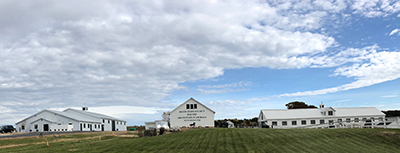
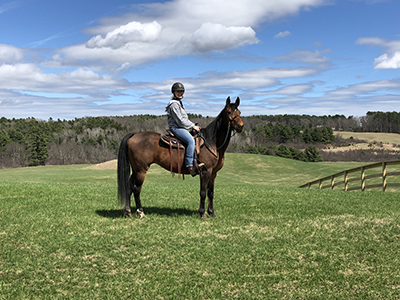
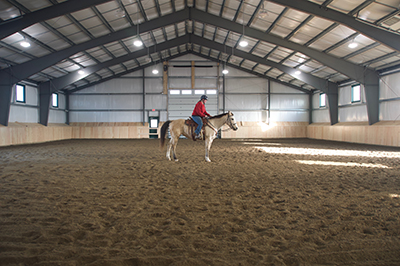
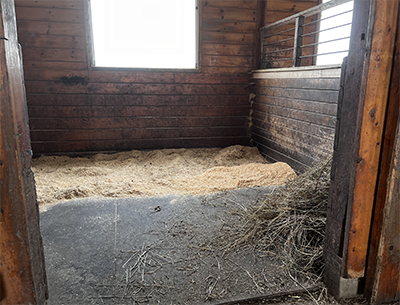
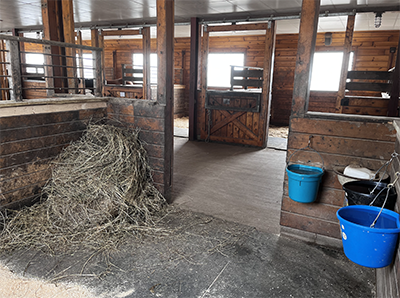
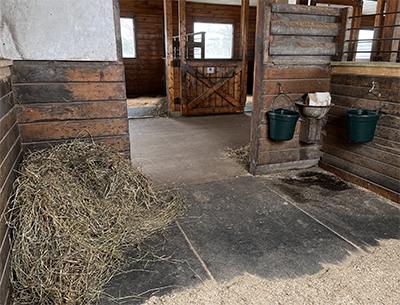
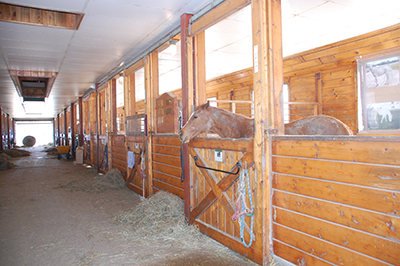
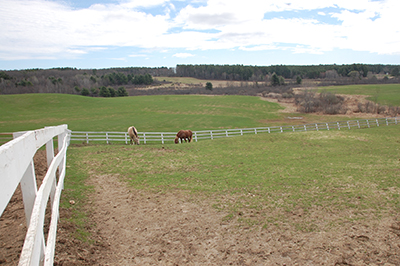
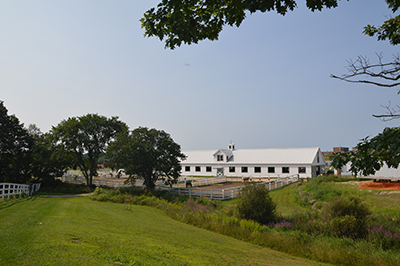
Are the organization's rules, restrictions and warnings (signage) conspicuously posted in easily accessible locations? Yes
Are the organization's emergency contacts, including veterinarian contact information, conspicuously posted in easily accessible locations? Yes
Are human and equine first aid kits easily accessible? Yes
Regarding all shelters where horses are housed including run-in sheds:
Do horses have assigned stalls in the barn/structure(s) or exclusively assigned shelter locations where they are separated from other horses with a barrier? Yes
How many hours per day, on average, are horses stalled or restricted to these sheltered exclusive shelter locations? 13-16
How often are the stalls/shelters cleaned, i.e., kept in good repair and free of standing water, accumulated waste, sharp objects and debris? 6-7 Days a Week
Do all stalls/shelters allow horses to lie down, stand up and turn around and provide protection from inclement weather (wind, sleet, rain, snow and extreme temperatures)? Yes
Are stalls/shelters kept in good repair, with adequate ceiling height, and free of standing water, accumulated waste, sharp objects and debris? Yes
Are floors constructed and maintained for both good drainage and traction? Yes
Is there a ventilation and circulation system in place to allow free flow of air to control temperature, and humidity, and to prevent air stagnation? Yes
Is wiring inaccessible to horses and maintained for safety in all areas of facility? Yes
Are fire prevention/protection measures (fire alarms, extinguishers and sprinkler systems) maintained and in good working order? Yes
Is there adequate lighting to ensure safety in all areas of facility? Yes
How many hours per day, on average, are horses turned out:
Equines are out 4 to 8 hours per day
Equines are out 24/7
Equines are out 24/7 except they are brought in if there is inclement weather
Equines are out 24/7 except when they are being trained
The following describes the pastures at this facility:
All pastures are fenced to prevent escape or injury
Fencing checks, such as broken or missing planks, loose fence posts, exposed or loose nails, detached wires, etc., are done regularly
Pastures are rotated
Pastures have natural protection for equines (i.e., trees)
Pastures have man-made protection for equines (i.e., shelters)
Not Checked:
This facility does not have pastures where equines can graze on pasture grass
This facility has a written plan in place for pasture management, which includes guidelines for seeding, fertilizing, irrigation, mowing, dragging, harrowing, manure removal, removal of debris, the control of poisonous plants, and a schedule for cleaning
A dedicated staff person(s) is responsible for pasture management
Barbed wire is used for fencing
Electric fencing is used; electric wires or tape fence are visibly marked
This facility does not have pastures where equines can graze on pasture grass
This facility has a written plan in place for pasture management, which includes guidelines for seeding, fertilizing, irrigation, mowing, dragging, harrowing, manure removal, removal of debris, the control of poisonous plants, and a schedule for cleaning
A dedicated staff person(s) is responsible for pasture management
Barbed wire is used for fencing
Electric fencing is used; electric wires or tape fence are visibly marked
The following describes the turnout areas other than pastures at this facility:
All turnout areas are fenced to prevent escape or injury
Turnout areas have man-made protection for equines (i.e., shelters)
Fencing checks, such as broken or missing planks, loose fence posts, exposed or loose nails, detached wires, etc., are done regularly
Not Checked:
This facility does not have turnout areas
This facility has a written plan in place for the maintenance of turnout areas, which includes a schedule for cleaning, manure removal, and dragging
A dedicated staff person(s) is responsible for the maintenance of turnout areas
Barbed wire is used for fencing
Electric fencing is used; electric wires or tape fence are visibly marked
This facility does not have turnout areas
This facility has a written plan in place for the maintenance of turnout areas, which includes a schedule for cleaning, manure removal, and dragging
A dedicated staff person(s) is responsible for the maintenance of turnout areas
Barbed wire is used for fencing
Electric fencing is used; electric wires or tape fence are visibly marked
The following policies and procedures are in place at the facility to restrict public access and to keep horses safe:
There is a practice in place to monitor equines overnight
By Appointment Only signs are posted.
No Trespassing signs are posted
Hold Harmless signs are posted
Authorized Personnel Only signs are posted
Entrance gates are locked at night
Visitors are only permitted at specific times
Visitors are only permitted in specific areas
The property is fitted with a security system monitored by police or a professional service
The property is fitted with a security system that is monitored internally by staff (or the property owner)
Not Checked:
The property owner, staff member or caretaker lives on the premises and ensures that public access is restricted and is responsible for the security of the facility and equines
A security guard is present at night
The property is fitted with motion lights
The perimeter of the property is fully fenced
The property owner, staff member or caretaker lives on the premises and ensures that public access is restricted and is responsible for the security of the facility and equines
A security guard is present at night
The property is fitted with motion lights
The perimeter of the property is fully fenced
Equine Care/Emergency Preparedness: Maine State Society for the Protection of Animals (*Main) 2026 and 2025 This section is required.
Horse Health Care/Barn Management Records: What system is used to collect and store health/horse care records?
Onsite computer with cloud-based backup storage system
Our organization utilizes a software application to maintain records
Our organization would use free cloud-based barn management software if available
The following items are consistent with our feed management plan and practices:
Equines are provided with individualized feeding plans, including supplements, according to the equine's age, breed/type, condition, size, work level and any health issues, consisting of nutritious food provided in sufficient quantity and access to adequate natural forage, or be fed daily, or as recommended by the organization's veterinarian
Feed plans are determined in consultation with a veterinarian
Supplement plans are determined in consultation with a veterinarian
Equines are fed grain in individual stalls
Staff and/or volunteers are trained in proper feed measurements and protocols and observed periodically to ensure they are feeding correctly
The feed chart is centrally located and updated as needed
The area(s) where hay, feed, grain, and supplements are stored are kept clean, free of debris and chemicals, and protected from weather and other animals in rodent-proof and mold-proof containers and grain bins
Feed, supplements and hay types are clearly labeled
Water sources, i.e., buckets, troughs, automatic waterers, etc. are kept clean, free of contaminants, debris and chemicals, protected from weather and other animals, and be positioned or affixed to minimize spillage.
Medications are kept in a secure area
Not Checked:
Equines are fed grain in groups
Equines are fed grain in groups
Is clean, potable water available at all times for all equines? Yes
Hoof Care: How often is hoof care provided for each equine? Every 4-8 weeks and when an issue arises
Dental Care: How often is dental care provided for each equine? Annually and when an issue arises
Horse checks: How often are equines visually and physically checked by personnel at the facility? Every day or 6 days a week
Our organization has the following parasite and fly/insect control protocols in place, including remedies used to control flies and insects:
Our organization follows the parasite control guidelines of our veterinarian, including fecal testing and de-worming
Fly/Insect Control Remedies:
Fly parasites
Fly Traps and Tapes
Fly Spray Repellent
Fly Masks
Fly Sheets
Fans
Not Checked:
The following represent the biosecurity practices in place at facility:
Our organization follows the biosecurity guidelines of our veterinarian
Sick, affected and/or quarantined equines do not have contact with other equines or other animals
The organization has a written biosecurity plan
A specific individual is trained and assigned to care for sick, affected and/or quarantined equines
Sick, affected and/or quarantined equines are cared for last if the caretaker must also care for healthy equines
Restricted access signs are posted at primary points of access to sick, affected and/or quarantined equines
Hand sanitizers are available at all primary points of access to sick, affected and/or quarantined equines
Footbaths are available at all primary points of access to sick, affected and/or quarantined equines
Quarantine areas, such as stalls, aisle ways, paddocks, and common areas, are cleaned (and needed, disinfected) after conclusion of the quarantine.
Trailers/vans used by sick, affected and/or quarantined equines are cleaned and disinfected after each use and cleaning takes place away from where equines are sheltered
Equipment used by sick, affected and/or quarantined equines is not shared
Equipment used by sick, affected and/or quarantined equines is cleaned of organic debris and disinfected after each use
Latex gloves, or equivalent gloves, are worn when working with sick, affected and/or quarantined equines
Not Checked:
Staff are trained in best practices related to biosecurity
Volunteers are trained in best practices related to biosecurity
Manure and bedding from sick, affected and/or quarantined equines is removed from the facility - not put in open air piles, and not spread on pastures
Equines are not quarantined on arrival.
Staff are trained in best practices related to biosecurity
Volunteers are trained in best practices related to biosecurity
Manure and bedding from sick, affected and/or quarantined equines is removed from the facility - not put in open air piles, and not spread on pastures
Equines are not quarantined on arrival.
The following represent the manure removal practices in place at facility:
Manure is hauled, sold or given away
Our organization adheres to the manure management guidelines set by the state, local authorities, and/or our organization's veterinarian
Not Checked:
Manure is stored in dumpster(s)
Manure is piled in an area where equines are not located
Manure piles are covered
Manure piles are composted or spread on pastures
Manure is stored in dumpster(s)
Manure is piled in an area where equines are not located
Manure piles are covered
Manure piles are composted or spread on pastures
The following steps are taken to help staff and volunteers readily identify each horse on the property:
Equines are assigned the same exclusive stall/shelter location each day
Name plates are located on the stall/shelter location
Photos are located on the stall/shelter location
A map/diagram is posted showing the location of each equine with equine names and photos
Equine photos and profiles are available on the website
Staff/volunteers are provided training on conformation, markings, colors, and breeds
Not Checked:
Equines wear halters with nametags
A notebook or binder with photos and information on each equine is easily accessible
Staff and volunteers are provided with an information packet with equine profiles, including photos and detailed descriptions
Equines are assigned the same exclusive stall/shelter location each day
Equines wear halters with nametags
A notebook or binder with photos and information on each equine is easily accessible
Staff and volunteers are provided with an information packet with equine profiles, including photos and detailed descriptions
Equines are assigned the same exclusive stall/shelter location each day
Our organization has the following policies and procedures in place pertaining to tack, apparel and equipment:
Saddles are shared
Saddle pads are shared
Bridles are shared
Blankets, sheets and turn out apparel are fitted and utilized for each equine appropriate to the equine's needs and the weather conditions
Blankets, sheets and turn out apparel are cleaned regularly as needed
Riding Tack is always cleaned after each use
Riding Tack is inspected for overall working condition before each use by trained personnel
Riding Tack is assessed for fit before each use by trained personnel
Riding Tack is assessed for fit by trained personnel when an equine's body condition changes
Riding Tack is assessed for fit by trained personnel when an equine's disposition changes
Riding Tack is stored in a climate-controlled location
Helmets are replaced after a fall
Not Checked:
All equines have specifically assigned apparel, equipment and tack (saddles/bridles if ridden) that is not shared
Bits are shared
Blankets are shared
Sheets are shared
Turnout apparel is shared
Halters are shared
Riding Tack is always cleaned at least weekly
Riding Tack is cleaned only when needed
This facility enlists the services of a professional saddle fitter at least once a year
Assigned riding tack is clearly labeled
Helmets are shared
Helmets are cleaned/disinfected after each use
Helmets are replaced at least every five years.
No equines are ridden; saddles, bridles, etc. not applicable.
All equines have specifically assigned apparel, equipment and tack (saddles/bridles if ridden) that is not shared
Bits are shared
Blankets are shared
Sheets are shared
Turnout apparel is shared
Halters are shared
Riding Tack is always cleaned at least weekly
Riding Tack is cleaned only when needed
This facility enlists the services of a professional saddle fitter at least once a year
Assigned riding tack is clearly labeled
Helmets are shared
Helmets are cleaned/disinfected after each use
Helmets are replaced at least every five years.
No equines are ridden; saddles, bridles, etc. not applicable.
Emergency Preparedness: Maine State Society for the Protection of Animals: *Main This section is required.
The following plans, policies, and procedures are in place at the facility to handle emergencies and address weather related issues, fire safety procedures, and/or any additional hazardous scenarios the facility could potentially experience:
The facility owns or has access to a generator
The facility maintains at least two weeks of hay, feed, shavings and medications
The facility collects and maintains medical information from staff, volunteers, and clients
The facility maintains appropriate liability and/or workers' compensation insurance
The organization has a written emergency preparedness/safety plan (EPP)
Not Checked:
Emergency procedures are posted prominently
The written EPP addresses the following areas: Emergency procedures are posted prominently
Local fire department and/or the state's emergency planning department procedures
Medical emergencies for clients, staff, and volunteers
Medical emergencies for equines
Fire
Natural Disasters - thunderstorm, hurricanes, earthquakes, tornados, etc
Protocols to notify emergency personnel
Building/facility exit plans
Not Checked:
Evacuation plans
Power outages
Terrorist attacks
Evacuation plans
Power outages
Terrorist attacks
The facility follows the specific procedures to help PREVENT emergency situations:
Smoking is strictly prohibited
NO SMOKING signs are posted prominently
Permanent or temporary structures where equines are stalled are kept free of dust, cobwebs, trash, cleaning rags, and other flammable items
Aisles and doorways are kept clear
Heaters with automatic shutoff settings are used
Not Checked:
Hay is stored away from permanent or temporary structures where equines are stalled
Hay is stored away from permanent or temporary structures where equines are stalled
How often are the following checked or performed?
Fire Extinguishers are checked: Annually
Smoke detectors are checked: Annually
Fence lines are checked: Daily
Turnout Areas are checked: Daily
Sprinkler systems are checked: Not at all/NA
Fire drills are conducted: Not at all/NA
Review of safety protocols with staff are conducted: Annually
Review of safety protocols with volunteers are conducted: Annually
The Emergency Preparedness Plan is reviewed and updated: Not at all/NA
Equine Transportation: 5= Onsite: 2 (2 + 0) + Offsite: 3
2-horse van/trailer with truck:
1 Owned onsite 2 Access offsite;
3-horse van/trailer with truck:
1 Owned onsite
4-horse van/trailer with truck:
1 Access offsite;
EQUUS Foundation Mentors receive a 5-Star Rating -- the EQUUS Foundation's highest rating based on the degree to which the organization meets the EQUUS Foundation standards for equine welfare and business practices.
If you have concerns about this organization, please contact us here.
© Copyright 2018 EQUUS Foundation 1370 5.00
© Copyright 2018 EQUUS Foundation 1370 5.00